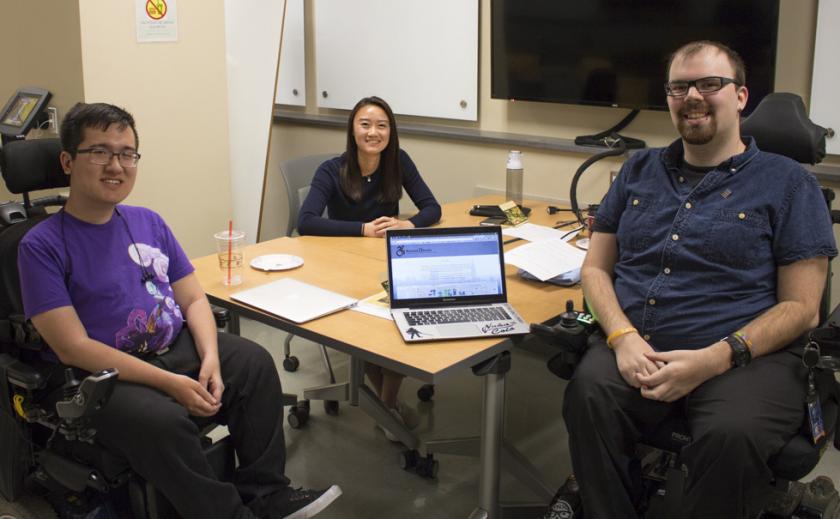The University of Illinois has long been a leader in accessibility for persons with disabilities. This tradition continues with a new web app called "Access Illinois" created by MS student Mark McCarthy and his team members Matt Arensdorf (undergraduate student, computer science) and Emily Chen (PhD student, computational linguistics). The app earned the team first place in HackCulture, a humanities-focused hackathon held at the University Library from April 8-23.

While the University provides accessibility maps, these maps require additional steps for successful use when a person is operating with one hand, such as when using wheelchair or cane. Access Illinois integrates existing accessibility maps with Google Maps, allowing individuals to discover walking directions to a destination and the locations of accessible entrances, classrooms, and restrooms.
The app has a personal connection for team members McCarthy and Arensdorf.
"Matt and I, having physical disabilities requiring the use of a wheelchair, use the accessibility maps often," McCarthy said. "There is currently not a way to get walking directions at the same time as looking at those maps, and for those who have even less mobility than us, it can be a challenge to navigate between the two tabs on the phone or desktop."
McCarthy, an iSchool information management student who is studying information architecture, was the lead web designer and debugger for the team. He also took care of the accessible programming. Arensdorf served as lead web developer, inputting GPS coordinates for the images by hand for each of the accessibility map overlays. Chen created the tour and pin functionality of the maps and led the research and testing.
At the moment, only the first floor of buildings appear in Access Illinois, due to programming constraints. Future versions of the web app will address the issue of multiple floors and include accommodations for a wider range of disability types, such as those requiring the use of screen readers.
"Once we have the first floor maps sorted, our aim is to give the tool to Disability Resources & Educational Services on campus to utilize for new and current students. We are also in talks to integrate it with the University Library's resource guides," said McCarthy. "Our hope is to quickly overcome the constraints in the beta version that are preventing us from providing multiple floor plans and to give students and visitors a well-rounded and full experience."
In addition to HackCulture, McCarthy participated in VariABILITY 2017, the first Social Hack on campus, on March 31-April 1. His team's idea was to build an "E-text Manual" to help people who have recently encountered some form of visual disability make a smoother transition back into their professional lives.